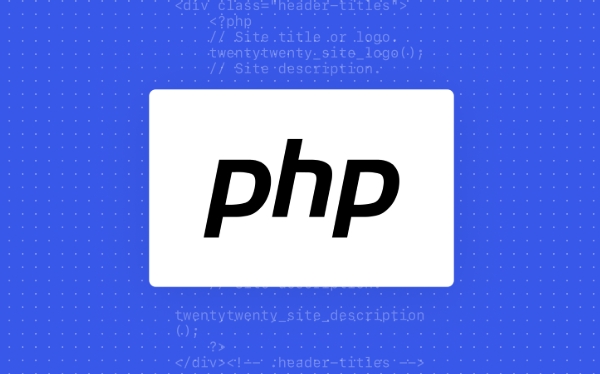 Backend Development
Backend Development
 PHP Tutorial
PHP Tutorial
 Mastering String Literals: The Nuances of PHP Escape Sequences
Mastering String Literals: The Nuances of PHP Escape Sequences
Mastering String Literals: The Nuances of PHP Escape Sequences
Aug 01, 2025 am 07:38 AMDouble quotes interpret escapes and variables, single quotes keep things literal; use double-quoted strings for dynamic content with variables and escape sequences like \n or $, use single-quoted for raw text to avoid unintended parsing, apply heredoc for multi-line interpolated strings and nowdoc for multi-line literals, and always escape backslashes properly in file paths or use DIRECTORY_SEPARATOR to prevent errors.

When working with string literals in PHP, understanding escape sequences is essential—especially when dealing with dynamic content, file paths, or output formatting. While PHP’s handling of escapes might seem straightforward at first, subtle differences between single-quoted and double-quoted strings can trip up even experienced developers.

Double-Quoted Strings: Where Escaping Matters
In PHP, double-quoted strings interpret escape sequences. This means certain character combinations starting with a backslash (\) are processed and replaced with special values.
Common escape sequences in double-quoted strings include:

-
\"– Inserts a literal double quote -
\$– Prevents variable interpolation (useful if you need a literal$) -
\\– Inserts a single backslash -
\n– Newline -
\r– Carriage return -
\t– Tab -
\v– Vertical tab -
\e– Escape character (ASCII 27) -
\0to\377– Octal character codes -
\x00to\xFF– Hexadecimal character codes -
\u{0000}to\u{10FFFF}– Unicode codepoints (if enabled)
For example:
echo "Hello\tWorld\n"; // Outputs: Hello World
// (on a new line)This behavior makes double-quoted strings powerful for formatting, but also means you must be careful when you don’t want interpretation—like when writing Windows file paths or regex patterns.

Single-Quoted Strings: Minimal Escaping
Single-quoted strings are more literal. Most escape sequences are ignored. The only two exceptions are:
\\– becomes a literal backslash\'– becomes a literal single quote
Everything else is treated as plain text:
echo 'Hello\nWorld'; // Outputs: Hello\nWorld
No newline is inserted. This makes single-quoted strings ideal when you want to avoid unintended interpretation or performance overhead from parsing.
So if you're embedding HTML or JavaScript that contains many $ or \, single quotes help avoid backslash clutter.
Heredoc and Nowdoc: Extended String Flexibility
For multi-line strings, PHP offers heredoc and nowdoc.
- Heredoc behaves like double-quoted strings (variables and escapes are processed).
- Nowdoc behaves like single-quoted strings (no interpretation).
Example:
$name = "Alice"; echo <<<EOT Hello $name\n How are you? EOT; // Output: Hello Alice\n // How are you?
Wait—notice \n didn’t become a newline? That’s because by default, heredoc does parse escape sequences, but only if they’re valid. In this case, \n is valid, but depending on context (like whether it's followed by a digit), it may or may not be interpreted. To ensure a real newline, use an actual line break or PHP_EOL.
Better example with explicit newline:
echo <<<EOT Hello $name How are you? EOT;
Nowdoc avoids this entirely:
echo <<<'EOT' Hello $name\n No variables or escapes here. EOT;
This outputs the string exactly as written.
Practical Tips and Common Pitfalls
- Use single quotes when you don’t need variables or escapes—it’s slightly faster and cleaner.
-
Escape
$in double-quoted strings if you want a literal dollar sign:"The cost is \$10" -
Watch out for octal confusion:
"\40"is a space (octal 40), but"\8"or"\9"becomes just"8"or"9"because 8 and 9 aren’t valid octal digits. PHP silently drops invalid octal sequences. -
Unicode escapes require the
uflag in certain contexts (likepregfunctions), but in strings,\u{...}works only in double-quoted or heredoc if Unicode support is enabled (default in modern PHP). -
Backslashes in file paths: On Windows, use forward slashes
/or double backslashes\\in double-quoted strings. Or better—useDIRECTORY_SEPARATORorrealpath()to avoid issues.
Basically, just remember:
Double quotes → interpret escapes and variables.
Single quotes → almost everything is literal.
It’s not complex, but getting it wrong leads to bugs that are hard to spot—like missing quotes in HTML attributes or broken JSON output.
So choose your quotes wisely.
The above is the detailed content of Mastering String Literals: The Nuances of PHP Escape Sequences. For more information, please follow other related articles on the PHP Chinese website!

Hot AI Tools

Undress AI Tool
Undress images for free

Undresser.AI Undress
AI-powered app for creating realistic nude photos

AI Clothes Remover
Online AI tool for removing clothes from photos.

Clothoff.io
AI clothes remover

Video Face Swap
Swap faces in any video effortlessly with our completely free AI face swap tool!

Hot Article

Hot Tools

Notepad++7.3.1
Easy-to-use and free code editor

SublimeText3 Chinese version
Chinese version, very easy to use

Zend Studio 13.0.1
Powerful PHP integrated development environment

Dreamweaver CS6
Visual web development tools

SublimeText3 Mac version
God-level code editing software (SublimeText3)

Hot Topics
 Navigating Backslash Hell: A Deep Dive into `preg_quote()` and Regex Escaping
Jul 26, 2025 am 09:51 AM
Navigating Backslash Hell: A Deep Dive into `preg_quote()` and Regex Escaping
Jul 26, 2025 am 09:51 AM
preg_quote()escapesregex-specialcharacters,includingbackslashesandthedelimiter,totreatthemasliterals;2.avoiddouble-escapingbypassingrawstrings(e.g.,'C:\path')withoutpre-escapedbackslashes;3.useforwardslashesinpathswhenpossibletoreducebackslashclutter
 Escape Character Behavior in PHP's Heredoc and Nowdoc Syntaxes
Jul 26, 2025 am 09:45 AM
Escape Character Behavior in PHP's Heredoc and Nowdoc Syntaxes
Jul 26, 2025 am 09:45 AM
Heredoc handles variable interpolation and basic escape sequences such as \n, \t, \\, \$, but does not process \" or \', while Nowdoc does not perform variable interpolation and any escape processing. All contents, including \n and variables are output literally; 1. Variables such as $name will be replaced, \\n will be parsed as newlines; 2. $name and \n are kept as is true in Nowdoc; 3. No escape quotes are required for both; 4. The end identifier must occupy one line and no leading spaces. PHP7.3 allows the use of spaces to indent the end identifier. Therefore, Heredoc is suitable for multi-line strings that need to be formatted, and Nowdoc is suitable for outputting original content such as SQL or JavaScript.
 Modern PHP Escaping Patterns for Secure and Clean Code
Jul 26, 2025 am 09:51 AM
Modern PHP Escaping Patterns for Secure and Clean Code
Jul 26, 2025 am 09:51 AM
Alwaysescapeoutputusingcontext-specificmethods:htmlspecialchars()forHTMLcontentandattributes,rawurlencode()forURLs,andjson_encode()withJSON_HEX_TAG,JSON_HEX_APOS,JSON_HEX_QUOT,andJSON_UNESCAPED_UNICODEforJavaScript.2.UsetemplatingengineslikeTwig,Lara
 Single vs. Double Quotes: A Definitive Guide to Escape Character Behavior
Jul 28, 2025 am 04:44 AM
Single vs. Double Quotes: A Definitive Guide to Escape Character Behavior
Jul 28, 2025 am 04:44 AM
InBash,singlequotestreatallcharactersliterallywhiledoublequotesallowvariableexpansionandlimitedescaping;inPythonandJavaScript,bothquotetypeshandleescapesthesame,withthechoicemainlyaffectingreadabilityandconveniencewhenembeddingquotes,sousesinglequote
 The Art of the Backslash: Demystifying Escape Characters in PHP Regular Expressions
Jul 27, 2025 am 03:18 AM
The Art of the Backslash: Demystifying Escape Characters in PHP Regular Expressions
Jul 27, 2025 am 03:18 AM
TomasterbackslashesinPHPregex,understandthattwolayersofparsingoccur:PHPprocessesescapesequencesfirst,thentheregexenginedoes;2.UsesinglequotesforregexpatternstoavoidPHPinterpretingescapeslike\basbackspace;3.Indoublequotes,doublethebackslashes(e.g.,&qu
 A Comparative Analysis: `addslashes()` vs. `htmlspecialchars()` vs. `mysqli_real_escape_string()`
Jul 27, 2025 am 04:27 AM
A Comparative Analysis: `addslashes()` vs. `htmlspecialchars()` vs. `mysqli_real_escape_string()`
Jul 27, 2025 am 04:27 AM
addslashes() should be avoided for SQL escapes because it is not safe and not protected from SQL injection; htmlspecialchars() is used for HTML output to prevent XSS attacks; mysqli_real_escape_string() can be used for string escapes in MySQL queries, but is only a suboptimal option when preprocessing statements cannot be used. 1. addslashes() is outdated and unsafe and should not be used for SQL escape in modern applications; 2. htmlspecialchars() should be used when outputting user input and outputting to HTML to prevent XSS; 3. mysqli_real_escape_string(
 Beyond `addslashes()`: Contextual Escaping for Robust SQL Injection Defense
Jul 26, 2025 am 02:55 AM
Beyond `addslashes()`: Contextual Escaping for Robust SQL Injection Defense
Jul 26, 2025 am 02:55 AM
SQL injection protection cannot rely on addslashes() because it does not process multi-byte encoding and only escapes finite characters, which is easily bypassed; preprocessing statements (such as parameterized queries for PDO or MySQLi) should be used to separate the data from SQL logic to ensure that the input is not parsed into code; if preprocessing cannot be used, database-specific escape functions (such as real_escape_string and setting the correct character set), identifier whitelist or quotation mark wrapping, integer input casting and other methods should be used according to the context to achieve hierarchical defense.
 The Escaped Escaper: Handling Literal Backslashes in PHP Strings and Paths
Jul 26, 2025 am 09:35 AM
The Escaped Escaper: Handling Literal Backslashes in PHP Strings and Paths
Jul 26, 2025 am 09:35 AM
BackslashesgomissinginPHPbecausetheyaretreatedasescapecharactersindouble-quotedstrings,sotofixthis:1.Usesinglequotesforliteralpathslike'C:\Users\John\Documents',2.Ordoublethebackslashesindoublequotesas"C:\\Users\\\\John\\Documents",3.Prefer





